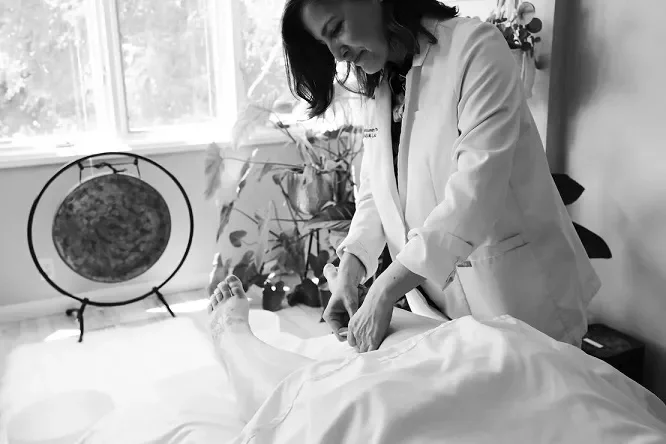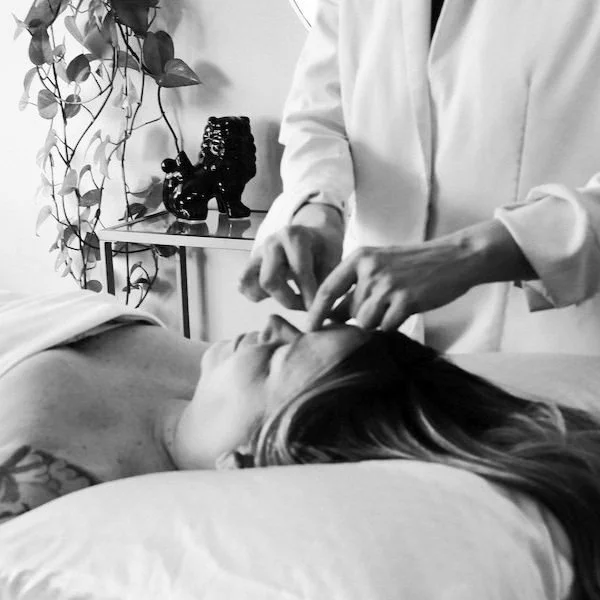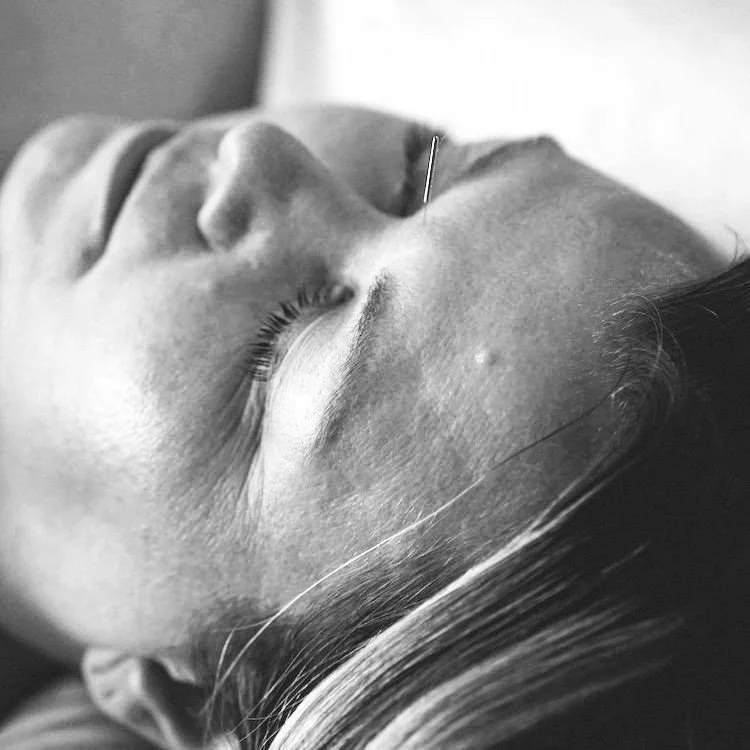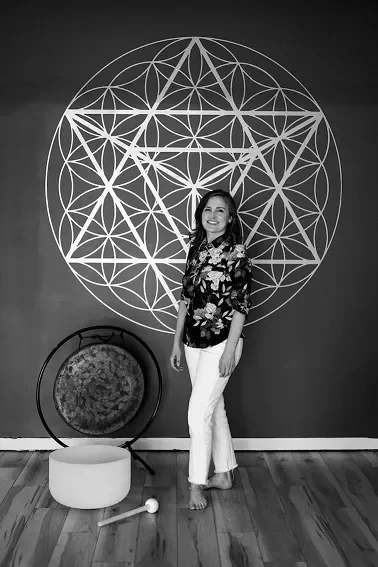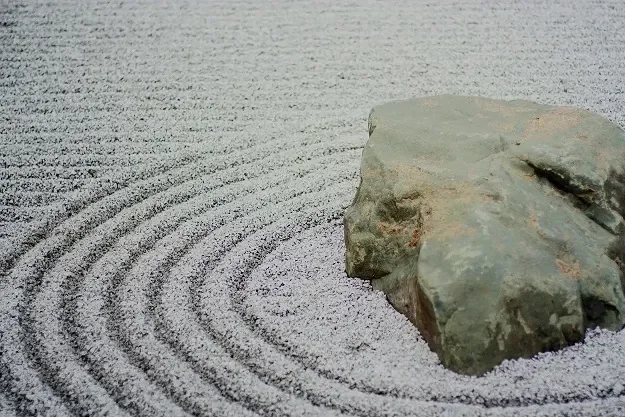
Acupuncture & Holistic Healthcare in Millcreek
Treat the Root Cause of symptoms like pain, irregular cycles, fatigue, poor digestion, dizziness, numbness, shortness of breath, headaches and much more…
An Acupuncture treatment begins with a comprehensive evaluation of your condition by Alessandra Young, a National Board Certified, Doctor of Acupuncture & East Asian Medicine.
Specialist in Pain, Anxiety & Women’s Health.
You will be prescribed a customized treatment plan based upon your individual presentation and specific health goals.
Treatments include a minimum of 2 modalities:
Acupuncture
Dry Needling / Orthopedic Acupuncture
Cupping Therapy
Tui Na or Shiatsu Massage
Gua Sha (similar to Graston Method)
Electric -Stimulation Acupuncture
Moxibustion
Guided Meditation
Herbal Topicals & Plasters
Nutrition Guidance
Supplement recommendations
Herbal Formula Prescriptions
For Acupuncture newbies…
A gentle, down-to-earth practitioner can mean the difference between high anxiety and deep relaxation. Thankfully, the needles are forgotten once you meet Alessandra. Friendly, knowledgable and skilled, Alessandra makes it her mission to identify and treat the root of each individual’s concerns, while keeping one relaxed and tranquil.
What is Acupuncture?
Acupuncture is a time-honored therapy that involves the gentle insertion of ultra-fine needles at carefully selected points on your body. Rooted in traditional Chinese medicine, acupuncture has long been recognized for its ability to alleviate pain. It has also been used to enhance overall wellness, including stress relief and relaxation.
“Superior doctors prevent disease. Mediocre doctors treat the disease before it is evident. Inferior doctors treat the full-blown disease.”
- Huang di Nei Jing
According to traditional Chinese medicine, acupuncture works by harmonizing the flow of energy—known as qi / “chi” —that circulates through pathways called meridians in the body. It is now understood that Meridian pathways follow structures called fascia and nerves in Western medicine. It is understood that our fascia and nerves are bio-electric systems - Qi pathways. When the needles are strategically placed along these meridians, they help restore balance, allowing the body's energy to flow freely and naturally.
In Western medicine, from a bio-medical perspective, Acupuncture is seen as a way to stimulate nerves, muscles, and connective tissues. This stimulation is thought to trigger the body’s innate healing responses, including the release of natural painkillers, promoting pain relief and improving overall function.
Whether you're seeking pain relief or a boost to your well-being, acupuncture offers a holistic approach to restoring balance and vitality, helping you live a more healthful and peaceful life.
Cupping Therapy
An Acupuncture treatment for Pain, Anxiety, and Woman’s Health may include Cupping Therapy.
Cupping is a myofascial release technique that relaxes the muscles, calms the nervous system, and improves blood and fluid flow into tissues and organs.
It is also detoxifying - pulling out extracellular waste and porting them through the lymphatic system to be cleansed from the body.
Some techniques leave bruises. These bruises are not painful and should resolve within 5-10 days. The quality of the bruising can indicate aspects of the quality of your health.
If you do not want bruising, please let your practitioner know and you will be accommodated.
DON’T LIKE NEEDLES ?
CUPPING ONLY TREATMENTS ARE AVAILABLE. This 30 minute treatment provides excellent muscle recovery.
Acupuncture treats all types of pain.
East Asian Medicine (Acupuncture & Herbs) has been used to address pain for thousands of years: menstrual pain, back pain, neuropathic pain, TMJ pain. arthritis pain, knee pain, shoulder pain - all types of pain. There are many causes, so the first step in treatment is to diagnose the source of your pain through a comprehensive intake assessing all of your body systems. Once diagnosed, there are a number of modalities that can be used to provide relief and healing and none of them are physically addicting (though - you could like it so much that you get a little hooked).
Is Acupuncture a Somatic Healing Practice?
Yes! “Somatic Healing / Somatic Therapy” are terms to describe Mind/Body healing. It recognizes that emotional and psychological distress can manifest as physical sensations, tension, and patterns in the body, and that addressing these physical symptoms can facilitate emotional healing. Acupuncturists draw upon a complete and complex system of understanding the human body. Each energy channel corresponds to an organ, an emotion, an element, an archetype of interacting with the world, a season, a sound, a smell, and a fascia (sinew) channel.
In Acupuncture there are 5 branches of the medicine: Acupuncture, Meditative Practices, Nutrition, Movement Practices, and Herbal Medicine. Each branch is a part of the whole philosophy about the connections that exist between mind and body, heaven, man and earth, the balance between yin and yang energies and much more. It is complex - and holistic!
How does Acupuncture work?
Balancing Energy (Qi)
In Traditional Chinese Medicine (TCM), pain and disease are often attributed to imbalances in the body’s Qi (energy) flow. The imbalance of Qi causes blood stagnation - blood does not flow and the tissues suffer. Blood contains iron and electrolytes for electrical conductivity - or Qi conductivity.
Acupuncture is believed to stimulate specific points on the body to restore the balance of Qi, encourage smooth blood flow, and release any blockages in the meridians (energy pathways). This balance is thought to help regulate all of the systems of the body - blood flow, gut and hormone balance, nerve conduction etc.
Blood Stagnation: In TCM, pain can result from blood stagnation. For menstural pain, Acupuncture points related to the liver and uterus are targeted to promote circulation and alleviate this stagnation. For pain related to muscles, acupuncture points relating to the “sinew channels” are prescribed in an approach called “orthopedic acupuncture.” For pain related to dysfunctions of organs, Acupuncture points related to the affected meridian systems are used.
Qi Deficiency: Acupuncture may also address Qi deficiency, which is believed to weaken the body’s ability to regulate or alleviate pain. Qi is a consideration of the energetic body - the energy in the cells and the energy in the meridians.
Endorphin Release
From a modern perspective, acupuncture stimulates the nervous system, leading to the release of endorphins (natural pain-relieving chemicals). These endorphins can reduce pain perception and provide a sense of well-being. The needle insertion at specific acupuncture points can trigger the release of these endorphins, providing pain relief for injuries and during menstruation.
It is likely the release of endorphins that causes the deep feeling of relaxation one enjoys after a treatment.
Improved Blood Flow
Acupuncture helps improve circulation by relaxing muscles and expanding blood vessels. Increased blood flow to the uterus and surrounding tissues can alleviate pain associated with cramps and spasms. Increased blood flow to muscles and surrounding tissues can alleviate pain associated with strains and injury. This is especially helpful for menstrual cramps, which occur due to uterine muscle contractions.
Regulating Hormones
Acupuncture is also used to help regulate the hormonal systems that govern the menstrual cycle. It may influence levels of prostaglandins, the hormone-like substances that cause the uterus to contract. Excessive prostaglandin production is linked to more intense menstrual cramps.
By balancing hormone levels, acupuncture can potentially reduce the intensity of menstrual cramps, improve fertility, improve mood disorders related to menstrual cycles like PMS, PMDD, and improve symptoms related to PCOS.
Stress Reduction
Acupuncture has a well-documented effect on reducing stress and anxiety by stimulating the parasympathetic nervous system (the "rest and digest" system). Stress can worsen menstrual pain by increasing muscle tension and affecting hormonal balance. By promoting relaxation, acupuncture may help lower stress hormones like cortisol, which can in turn reduce the severity of menstrual pain.
High cortisol is also linked to belly fat or fisceral fat, so Acupuncture can be highly beneficial for losing weight around the mid-section and reducing fat around organs, which is detrimental to organ function.
Uterine Relaxation
Acupuncture may help relieve uterine spasms by stimulating specific points that promote relaxation of the uterine muscles. This can reduce the intensity and frequency of menstrual cramps.
This is why Acupuncture can also be helpful for conditions like a hypertonic pelvic floor.
Modulation of Inflammatory Pathways
Acupuncture may influence inflammatory pathways that play a role in menstrual pain. Research has suggested that acupuncture can modulate levels of pro-inflammatory markers in the body, which can reduce the inflammation and pain associated with menstruation.
For this reason, acupuncture is helpful for the treatment of endometriosis, fibroids and the condition of dysmenorrhea (painful periods).
Acupuncture is Highly Effective for the Treatment of Anxiety
Research shows that anxiety affects anywhere from 1% to 30% of people worldwide. It’s a condition that can look very different from person to person, with 13 different types of anxiety disorders recognized by mental health professionals. Symptoms can range from feeling short of breath and your heart racing, to more intense experiences like panic attacks, chronic headaches, body aches, and even trouble sleeping.
Anxiety is a complicated and widespread condition that often disrupts daily life. While medication is commonly prescribed to manage it, there are also alternative treatments, like acupuncture, that may help bring relief and restore balance to both the mind and body.
The latest research shows that acupuncture is a promising treatment for anxiety. A key study, The Acupuncture Evidence Project, published in 2017 by Dr. John McDonald and Dr. Stephen Janz, reviewed a wealth of clinical data and confirmed that acupuncture is moderately effective in treating anxiety. This study built upon earlier reviews and found strong evidence supporting acupuncture’s benefits.
For example, a 2016 systematic review of over 400 patients found that acupuncture produced significant improvements in anxiety, outperforming conventional treatments. The largest of these studies, which included 120 patients, revealed that acupuncture had a much larger impact on reducing anxiety and depression compared to standard treatments like medication and therapy—showing more than twice the reduction in symptoms.
In a more recent 2018 review, which included 13 studies, all found that acupuncture led to a decrease in anxiety levels compared to control groups, including studies that used pharmaceutical treatments as a baseline. This growing body of research supports acupuncture as a highly effective and natural option for managing anxiety.
The autonomic nervous system (ANS) plays a key role in maintaining the body's balance and well-being. It consists of two branches: the sympathetic nervous system (SNS), which triggers the body's "fight or flight" responses, and the parasympathetic nervous system (PNS), which promotes relaxation and recovery. These two systems work together to regulate vital functions, such as heart rate and blood pressure, depending on the situation. For example, the SNS ramps up heart rate and energy, while the PNS slows the heart rate and lowers blood pressure.
What’s exciting is that research shows acupuncture can influence both the SNS and PNS, helping to restore balance in the body’s stress response.
One of the most revealing signs of the body’s ability to handle stress is Heart Rate Variability (HRV). Unlike a metronome, the heart doesn’t beat in a perfectly steady rhythm. Instead, it fluctuates based on the body’s response to the environment. A higher HRV is linked to better overall health, including mental well-being and lower anxiety levels. Studies have shown that acupuncture can improve HRV, helping the body cope with stress more effectively.
When a person experiences stress, the brain's hypothalamus releases chemicals to help the body respond. Research indicates that acupuncture can help calm this stress response, easing the body’s physical reactions to stress.
Additionally, acupuncture has been shown to stimulate the release of endorphins, the body's natural "feel-good" chemicals. These endorphins help regulate stress responses, including pain, heart rate, blood pressure, and digestive function—further supporting the idea that acupuncture can help reduce anxiety.

